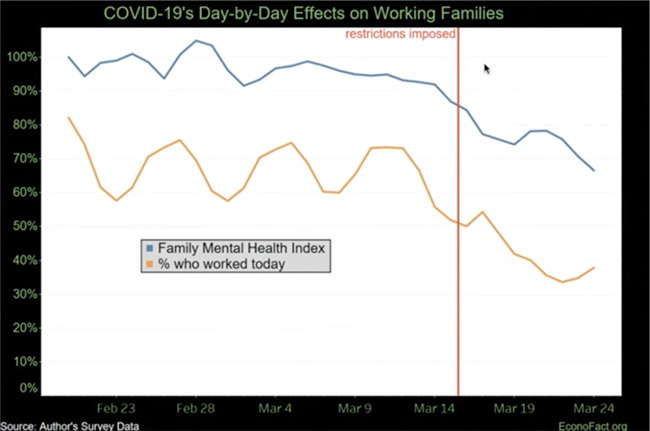Population Health
News
The Intersecting Health Disasters of the Pandemic and Its Economic Meltdown
A Penn LDI Virtual Seminar Reviews the Likely Long-Term Population Health Consequences
Reviewing scientific evidence collected from the country’s last century of economic downturns, LDI Senior Fellow and Penn Medicine Assistant Professor Atheendar Venkataramani painted a sobering picture of the likely long-term impact of the intertwined health disasters of coronavirus and the economic downturn it spawned.
Speaking at the latest in a series of Leonard Davis Institute of Health Economics “Experts at Home” virtual seminars on April 17, Venkataramani presented his synthesis of past and recent findings suggesting how the new “COVID economy” will negatively impact population health. The session was moderated by LDI Executive Director Rachel Werner, MD, PhD.
Economy-driven adverse effects
Venkataramani’s presentation was based on a large body of scientific literature documenting a variety of long-term, adverse health effects caused by exposure to the stress and chaos created by broad economic catastrophes, such as the Great Recession of 2008.

“If you look at the unprecedented spike of 22 million unemployment claims we’ve seen in the last four weeks, it makes the Great Recession look like a very small blip,” said Venkataramani, MD, PhD, a faculty member and researcher in the Department of Medical Ethics and Health Policy of Penn’s Perelman School of Medicine.
‘Lots of data and research’
“What we know from lots and lots of data and research is how economic downturns might influence health; so what can we expect based on this historical experience in regard to the COVID-19 driven downturns?,” he asked.
The most recent research indicates there are a lot more health harms in economic downturns than we initially realized.
Atheendar Venkataramani
“You could imagine that social isolation, changes in access to health care and the way health care is delivered now, and maybe even being out of school — all of these things could work together to modulate what might be the effects of COVID-19 directly as well as the economic effects of COVID on health outcomes.”
“For instance, the most recent research indicates there are a lot more health harms in economic downturns than we initially realized,” Venkataramani continued. “If you look at measures of morbidity, you definitely see evidence of harm. A lot of (research) work has linked economic downturns to things like poor mental health and worse physiologic markers like blood glucose and blood pressures. By age 40, those who were unlucky enough to be entering the labor market during bad economic times had a higher mortality risk relative to their peers who may have graduated during good times.”
Recession pregnancy data
“If you look at pregnant women during recessions,” he said, “they experience much greater stress, especially those who have low incomes. The babies born during a recession to those mothers tend to have worse birth outcomes, and we know from a large body of literature in a number of fields that birth outcomes are associated with health and wellbeing across the whole life course.”
“I worry that a persistent, long and deep economic downturn caused by COVID-19 could worsen mental health, worsen substance use disorder and lead to increases in domestic violence. The data further suggests that some chronic diseases could worsen,” Venkataramani said.
“We are already seeing some of this in a survey that was underway when COVID-19 hit,” he said. “You can see that when social distancing restrictions started to be imposed, the index of mental health — which includes depression, anxiety, and externalizing behaviors among children — also starts to worsen around the same time. So, the early data are already showing some harm to health.”
Paralyzing uncertainty
Venkataramani explained that COVID-19 economics are very different from past economic downturns that began in the malfunction of financial industry institutions. The current economic decline is directly caused by consumers staying out of retail stores and other public venues for fear of a potentially deadly contagion for which there is no treatment or vaccine. Even if federal or state authorities declare the economy “reopened,” that consumer uncertainty is likely to keep large numbers from engaging with their region’s brick-and-mortar retail establishments.
This is obviously a dire prediction but it does show you the importance of what uncertainty in this COVID-19 world could do as far as the depth of what we might face.
Atheendar Venkataramani
Venkataramani cited one model that focused just on this uncertainty and predicted a COVID-19 recession or drop in Gross Domestic Product similar to size of that of the Great Recession twelve years ago.
“Everything else beyond ‘uncertainty’ would double the impact,” Venkataramani said. “This is obviously a dire prediction but it does show you the importance of what uncertainty in this COVID-19 world could do as far as the depth of what we might face.”
Safety net deficiences
The Penn Medicine researcher also emphasized another factor in play during the downturn that can significantly influence long-term health and wellbeing at the population level: the nation’s safety net.
“A lot of the systems now dispensing funds through unemployment insurance, the Supplemental Nutrition Assistance Program (SNAP) and the Temporary Assistance for Needy Families (TANF) programs, are really old,” Venkataramani pointed out. “During the Great Recession, the federal stimulus set money aside for states to modernize these systems. Some states did that. Some didn’t. But what you’re hearing now is that some states are becoming overwhelmed and unable to actually process claims in this crisis. So, in an era witnessing unprecedented public distress in such a short time, the plumbing of these systems has to be good enough to deliver benefits that are both more accessible and potentially more generous.”